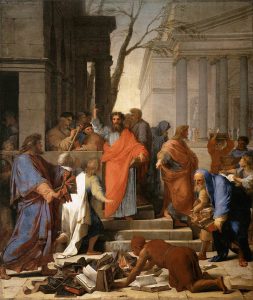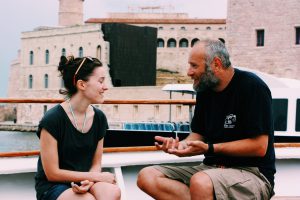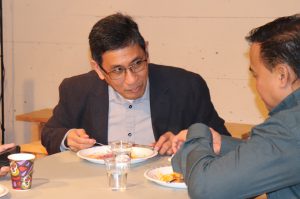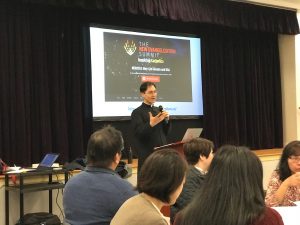How many real friends do you have? Do you know? “Here is a simple litmus test of whether or not you have any friends. Think of the most difficult struggle through which you are going at this time… it could be something physical, spiritual, or psychological… The question is: Whom have you told? Have you shared this with anyone? Friends share their struggles, and receive support” (Fr. Stephen J. Rossetti, The Joy of Priesthood, 95).
[Listen to Fr. Justin’s homily here.]
Brothers and sisters, and guests, some of us have friends; many of us probably don’t. But some of us have relationships that could be wonderful friendships with God’s help! And let me tell you: There are some issues in our lives that will only be healed in relationships. God heals us through other people.
God, in the First Reading, gives us a powerful example of how spiritual friendships can look. It says, “Paul and Barnabas returned to Lystra, then on to Iconium and Antioch. There they strengthened the souls of the disciples and encouraged them to continue in the faith, saying, ‘It is through many persecutions that we must enter the kingdom of God’” (Act 14:21-22).
Now there are two things here that require our attention:
1) St. Paul founded the Christian communities here; he preached to them and probably baptized them. But he doesn’t just leave them alone, but spends time with them and shares with them (Acts in Ancient Christian Commentary on Scripture, 178).
2) He tells them that we enter the kingdom of God through trials and sufferings. But he’s not just speaking in the abstract. He’s sharing from personal experience, because right before this gathering he was stoned! It says, “But Jews came there from Antioch and Iconium and won over the crowds. Then they stoned Paul and dragged him out of the city, supposing that he was dead. But when the disciples surrounded him, he got up and went into the city” (Acts 14:19-20). That’s amazing! Could you imagine how painful it would be to get hit multiple times with heavy rocks all over the body? They think he’s dead. But he gets up and goes back.
And so, when he was speaking to the disciples and encouraging them, he must have been bruised all over and wearing bandages of some kind. If I were there listening to him, his witness and sharing would inspire me to be more faithful to God, because if St. Paul is faithful after being stoned, so should I. It would also inspire me to be tougher, stop complaining, and put my troubles in perspective. It would remind me that to be a Christian means persecution, and loving and forgiving our enemies (Acts, 177).
Furthermore, the early Christians didn’t just share the difficult things, but the joyful. At the end of the First Reading, it says, “When they arrived [in Antioch], they called the Church together and related all that God had done with them, and how he had opened a door of faith for the Gentiles” (Acts 14:27).
You see, joy increases when it’s shared, and pain decreases when it’s shared. If we want to increase our joy, then we should share it—we do this naturally. And if we want to lessen our pain, then share it. This truth is what God is offering us today.
So one way to grow in this friendship and intimacy is to ask the right questions, and share from our hearts. We share what God is doing in our lives and listen to where God is moving in other people’s lives. This is what we call devout conversations (Fr. John O’Malley, The First Jesuits, 110-114), which come from the early Jesuits in the 1500s. It’s about asking questions of substance. “How are you?” is polite, but we can go deeper, for the sake of the other person.
Here are five examples:
1. “How are you doing?” “Well.” “How are things going lately?” Pay attention to the highs and lows of the person’s response. If someone says, “Yeah, work is going great,” then God’s working there—follow that! Find out what’s so great because their joy will increase! But listen also for the lows. “Um… I had a disagreement with my wife.” God’s working there, too. And we can ask, “What happened?” and then listen.
2. After Mass, after asking how someone is, you could try, “So what did you think of the homily?” Now here, typically they’ll say, “It was awesome,” so we have to follow up with, “What was awesome about it?” because something probably struck them, and that is God working.
3. One of my favourite questions is, “Anything happen recently for which you’re thankful?” because this question gets us right to gratitude, and gratitude allows us to perceive God’s workings.
4. One summer, when I was visiting from Rome, Kyle Neilson, who is another coach of mine, asked a most thoughtful question. He said, “Well, everyone probably asks you the same question about how Rome is. So, what do you want to talk about?” What a relief! Because everyone was staying at the level of clichés and no one was allowing me to go deeper.
5. One time, one of our parishioners had just given birth to her first child, and of course, it was such a beautiful moment. Therefore, at the end of our conversation after Mass, I asked her, “What’s the best thing about the whole experience of motherhood and giving birth?” She started to cry. So I didn’t press her any further, and said, “You don’t have to answer.” Later on, she did, and said that, after the delivery, when they put her son on her chest, “I had never experienced that type of joy, that level of joy and love, and I never knew I could experience it.” And she said it was great to share it, because, if no one had asked her the question, she wouldn’t have pinpointed that moment as one of the best moments of her life.
Now, never pressure people or make them feel uncomfortable. If someone doesn’t want to go deeper, don’t force them. We’re just giving people a chance to share what’s on their heart. And, if they do, listen and share in their experience! Say, “That’s wonderful! Tell me more,” or, “I’m sorry to hear that. Tell me more.” When, for instance, I meet someone new here, I don’t go too deep; the most loving thing to do is welcome them, make them feel at ease, and get to know them.
In addition, like St. Paul, be vulnerable and share something in your life. All of us have something to share. That’s why we’ve had many testimonies during Mass, because they’re real stories of how God has worked in our lives; they’re believable and relatable, and thus strengthen us.
You can strengthen and affirm people in ways I can’t. Sometimes only men can strengthen men, women encourage women, and only parents understand what parents are experiencing.
In this season called Breaking the Silence God is asking us to do what the early Christians did: Be a community where we share our joys and pains, and strengthen and encourage each other.
At our past Leadership Summit, I taught everyone in depth how to do this. Now I want to give you all permission to go in this direction. My dream for our parish is that, if we’re called to love like Jesus and proclaim Him in every circumstance, then we’ll ask loving questions and share what God has done in our lives.
And, for the next few weeks, when you greet me, could I ask you to ask me thoughtful questions, please? I’d love to have some devout conversations. Think about what you’ll ask. And, as we mentioned once before, those of you who normally greet me after Mass, please give others a chance to do so.
For the past month, since many leaders and I have been practicing devout conversations, there have been so many graces. I’ve seen people come alive talking about their grandchildren; I’ve seen people zero in on a passion or mission to which God has called them; I’ve brought up problems and then God gives me direction; and I’ve seen people be strengthened by affirmation.
One reason why Alpha and Faith Studies touch the heart is because they give us a safe place in which to open up and share what we’re feeling and thinking. And now one of our sisters is going to share what God has done in her life, particularly through Faith Studies and devout conversations. This will strengthen and encourage us.
******
Good evening, I have been a member of St Anthony’s Parish for almost 3 years. I am divorced and I have two beautiful adult children.
I was raised Catholic in the Philippines and continued to go to church when I moved to Canada. Around 10 years ago, I stopped living the life of a good Catholic by missing Sunday Masses, failing to go to confession, not fasting during lent, and I stopped praying. I put my work and family before God.
Then, in 2013, I suffered some tragic changes in my life. I lost my job, then later my husband and I divorced. I was also accused of stealing, though thankfully I was proven innocent later on. And to top it all off, I suffered a serious car accident.
All of these events made me feel alone, sad and depressed. I wondered if these tragedies happened because I had been ungrateful to and neglectful of God.
So I decided to start seeking God again. A friend of mine suggested that I try St. Anthony’s church, which I did. The moment I walked in, I fell in love with this church. The Hospitality members were very welcoming and the smiles on their faces were so encouraging and inviting. Fr. Justin’s homilies were extremely powerful and inspiring. And the choir was so beautiful and reverent. So in September 2016, I decided to join this parish and now get so much out of Sunday Mass.
I heard about the Faith Studies through one of the powerful testimonies and I decided to give it a try. I was so glad that I did because I gained so much knowledge and deepened my faith. I experienced profound changes in my life. I became more humble and set aside my pride. I became more patient and tolerant of myself and others. I am no longer sad and depressed, as I have made new spiritual friends who have been like another family to me. We love and support each other, learn from each other, and have so much fun while learning.
Now that my faith in God has been restored, I know that my life will continue to be blessed and that I can accept anything that comes my way, because, as St. Paul teaches today, suffering is part of the Christian life.
I enjoyed Faith Studies so much that I have gone through all levels and now look forward to becoming a leader for the next session on May 28th.
I hope that something I’ve said might encourage you to join. It could change your life for the better, as it did for me.
Thank you all so very much. God is always with us.
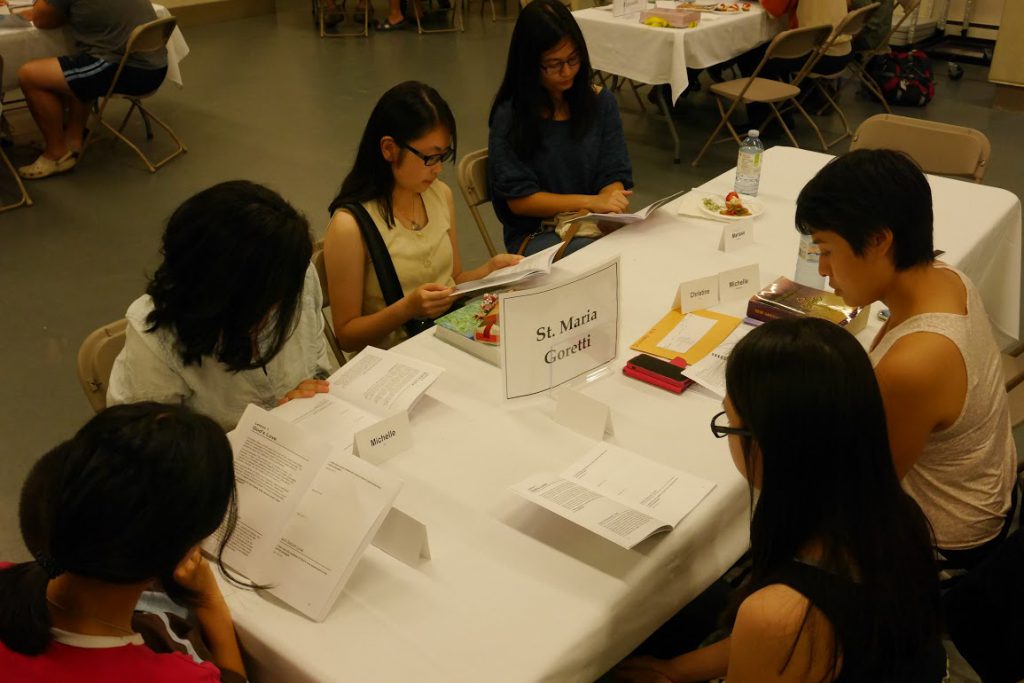
Faith Studies at St. Anthony’s: Tuesday nights, May 28 – July 2.

